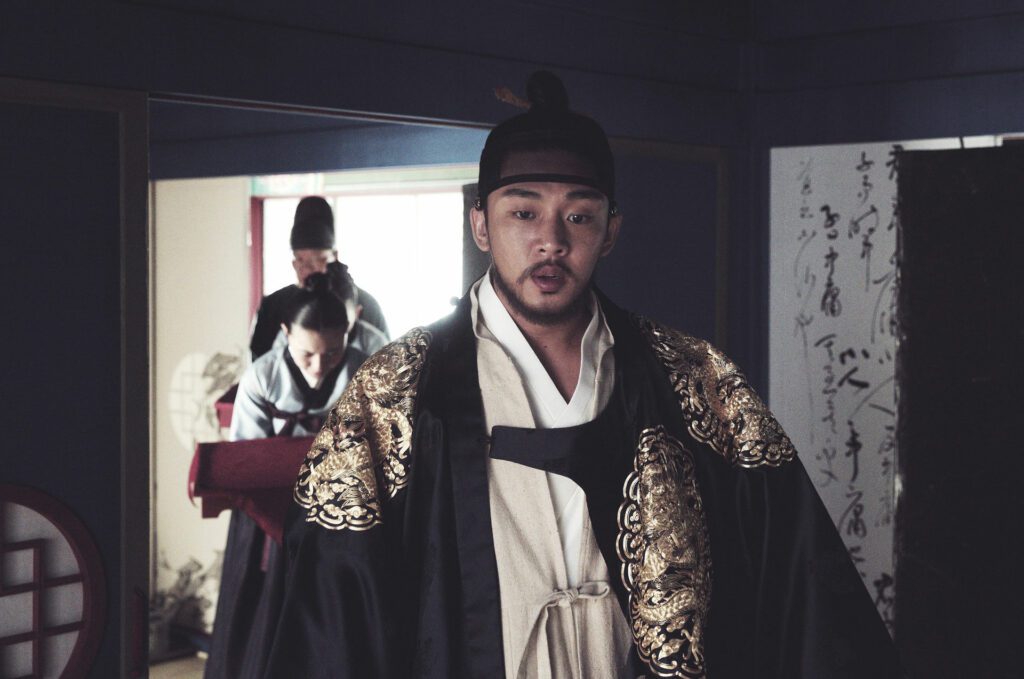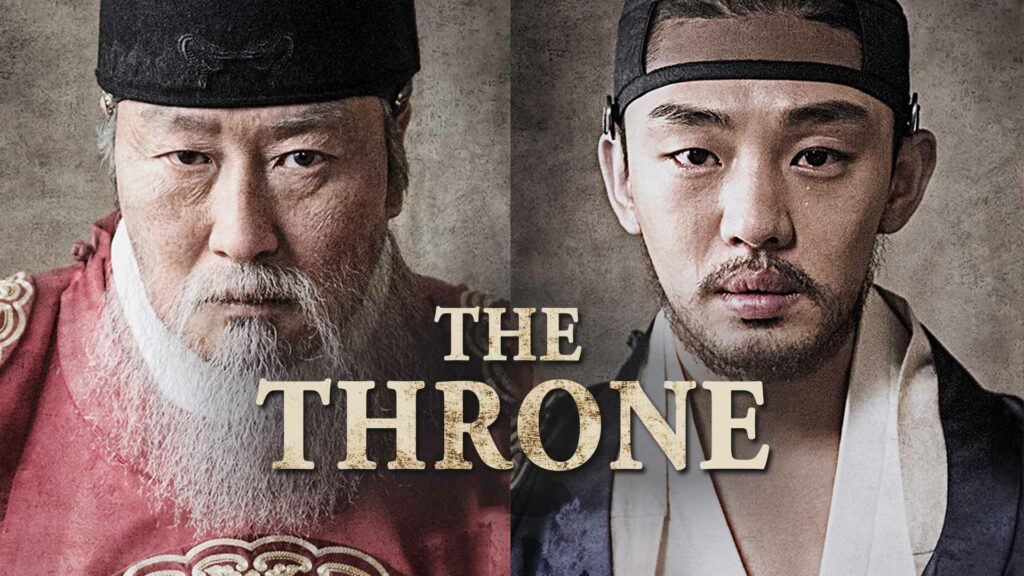Our Korean intern Su-gyeong is determined to educate us about K-Culture, Korean culture. Last week, she introduced us to ‘Mr Sunshine’, an epic 24-part series set at the decline of the Joseon Empire at the beginning of the 20th century. This week, she will talk us through ‘The Throne’, also set in the days of the Joseon Empire but two centuries earlier…
In the last recommendation, we introduced Mr Sunshine as a way to experience Korean culture. We covered the plot, main actors, and historical background of the drama. And we looked at the special elements of the movie that make you experience Korean culture. (Link to previous article)
The movie I’ll be introducing today is based on real events, The Throne. It’s about an incident in the history of the Joseon Dynasty, where a father, a king, killed his son, a crown prince. It is a movie that will bring tears to your eyes and make you feel many things while watching the story of the father and son.
The Throne – An Overview
Number of viewers: 6.24 million
Era: 1700s Joseon (18th century)
During this period, Spain was ruled by the Borbón dynasty from 1724 to 1776, and in 1759, Carlos III (1716-1788) ascended the throne.
Genre: Drama
Introduction: A depiction of the murder of the crown prince (Im-o-hwa-byeon) by King Yeongjo during the Joseon Dynasty. A movie about the tragic family history between father and son, king and prince.
Release: 16/09/2015, Korea, 125 minutes
Plot: Yeongjo (Song Kang-ho), who has suffered the controversy over his succession to the throne his entire life, strives to become the perfect king. He hopes that his only son, Seja (Yu A-in, ‘Seja’ meaning “prince” in Korean), will become a king who is recognised and respected by all. But he is disappointed when Seja grows up to be different to his expectations.
Although Seja was exceptionally intelligent as a child, the seja became interested in arts and martial arts and had free-spirited disposition. The Seja wanted to be a perfect prince, just as his father Yeongjo wished, but Yeongjo did not know Seja’s true feelings and only scolded him. So begins the tragedy of a father-son relationship…
Main Actors: Song Kang-ho (Yeongjo), Yu A-in (Seja), Mun Geun-yeong (Hye Kyeong-gung Hong)
Director: Lee Jun-ik
Su-gyeong’s star rating: 4/5
Why I recommend this movie
There are a lot of Korean historical movies, but I recommend this one in particular because it’s a movie that actually happened in the royal family, and it’s a sensitive portrayal of a family narrative. It’s also a family story, which makes it easy to relate to and makes you think about what good parenting looks like.
Also, the actors’ performances are insanely good. Song Kang-ho has been recognised for his acting skills in Parasite and Monster, and Yu A-in for Veteran and drama Secret Affair. Song Kang-ho plays the king Yeongjo, and Yu A-in is the prince Sado-Seja.


Explanation of terms
Seja: prince. The child of a king, the one who will inherit the throne.
Se-son: The son of Seja, the person who will succeed him on the throne.
Sado : ‘Sa’ means ‘to think’in – Chinese character ‘思’, ‘do’ means ‘to grieve’ in Chinese character ‘悼’. (Not his name, but a posthumous name given to him by Yeongjo)
Obsessive Dressing Disorder (ODD) (in royal clothing): a kind of obsession that makes it difficult to dressed – get especially for royals. (In the Joseon royal family, the prince must wear proper royal attire before going to meet the king. Because Seja was afraid to meet his father, he didn’t want to wear the outfit. He thought that the moment he put it on, he would have to meet his father.)
Dwiju : A wooden box used to store rice or grain
Movie commentary by writer Su-gyeong
(This is not a spoiler, but known historical facts)
During the Joseon Dynasty, father Yeongjo always wanted his son, Seja, to be perfect, and when Yeongjo appointed his younger son to be his successor, Seja was raised apart from his mother. As Seja grew up, he became increasingly skilled in martial arts and the arts, but his father wanted him to focus more on his studies, which led to frequent reprimands and scolding.
As an adult, Seja took on the role of acting prime minister and took care of state affairs, but Yeongjo still criticised Seja’s every behaviour. If Seja didn’t speak up and made his own decisions, Yeongjo asked why Seja didn’t report to him. If Seja spoke up and tried to make decisions, Yeongjo criticized Seja for not being able to make those decisions himself.
Seja steadily became mentally unstable in this environment, and even suffered from a mental illness called Obsessive Dressing Disorder. He didn’t want to wear the royal clothes because he thought it would mean he had to meet his father that the moment he put it on. In the Joseon royal family, the prince had to be dressed according to etiquette to meet the king.
He became obsessed with the idea of seeing his father every time he got dressed, and his anger became so intense that he killed his servants in the palace. There was also one attempt to kill Yeongjo secretly, but it backfired.
In order to stabilise the royal family, Yeongjo imprisoned Seja ina wooden box (a dwiju). Eight days later, the seja died in Dwiju. As a result, Yeongjo gave Seja a posthumous name ‘Sado’, which means a combination of to think, and to grieve.
Is there more to life than studying? Korean cultural themes that can be seen in the movie The Throne
Enthusiasm for education (교육열 in Korean) is rampant in Korea. While this is not true for all families, many Korean families send their children to academy from elementary school and invest heavily in their children’s education. There is no Western term equivalent to ‘교육열’, but there is a culture in Korea that values studying and considers good academic background to be the highest value.
Yeongjo’s behaviour in the movie is a great example of this. Yeongjo’s unconditional emphasis on studying and etiquette, and his intolerance towards arts and martial arts, implies the need to recognise diverse values in the world.
Enthusiasm for education is a useful tool for academic and social development and a key driver of economic growth when it comes into play in the optimal way. However, education fever puts excessive pressure on individuals and reduces their happiness. This can lead to social problems. In fact, there is currently a kind of obsession in South Korea with doing well in school and getting into a prestigious university, leading to young couples to avoid giving birth to a child because they feel overwhelmed by the cost of education, Bloomberg has reported, citing experts.
South Korea is in serious need of interpreting the education fever in a positive manner. In the movie The Throne, Yeongjo’s enthusiasm for education was portrayed in the wrong way, like his obsession with son and his compulsion for perfection. If Yeongjo had allowed Seja to grow up with the love of his parents instead of making him a crown prince early on, and if Yeongjo had recognised Seja’s talent for the arts, the future of Joseon might have taken a different path.
Parents should give love to their children, and their expectations of their children should not be misrepresented. Therefore, this movie makes Koreans think about the desirable relationship between parents and children and how to give love to their children.
Conclusion
The Throne depicts a personal tragedy within the Confucian culture of Korea, which emphasises filial piety(孝) and loyalty(忠). The actors’ performances are outstanding and the plot based on historical facts is terrific. In addition, the traditional costumes and music of the Joseon royal family, as well as the landscapes of Korea, show us Korean culture at the time, which I think you will find fascinating.
The Throne is available on Amazon Prime Video. Spanish subtitles may not be available, but you can watch it with English subtitles. Also, you can download English subtitles from OpenSubtitles.org.
In our next article, I’ll be covering the No.1 movie in South Korea, Roaring Currents. Stay tuned!